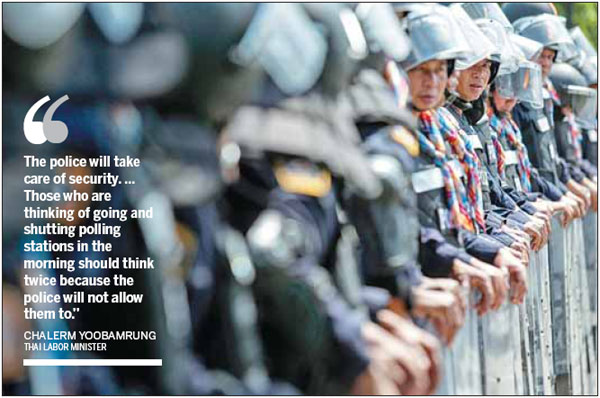Thai economy reels amid unrest
National image needs rebuilding after riots, says tourism official
As protests grip Bangkok and bitter controversy continues over looming elections, Thailand is facing battered investor confidence, lower growth and millions of dollars in lost tourist revenues, experts say.
The Southeast Asian nation has been dubbed "Teflon Thailand" for its ability to recover quickly from numerous economic knocks associated with political turbulence that has beset the country since a 2006 coup.
But the latest unrest has raised fresh concerns that businesses and visitors could tire of repeated rounds of protest and regime change in the polarized kingdom, a regional manufacturing and tourism hub.
"We have suffered again and again - we have to heal and build up our image again and again. It is a waste of time," Piyaman Tejapaibul, president of the Tourism Council of Thailand, said as hotels, shops and restaurants complain of reduced revenues after weeks of rallies.
Protesters, backed by the Bangkok middle classes and powerful elements in the elite, have embarked on a self-styled "shutdown" of the Thai capital in their latest push to topple the government.
Prime Minister Yingluck Shinawatra has called a snap Feb 2 election in an attempt to staunch the political tensions, but the main opposition Democrat party is boycotting it and demonstrators have vowed to block voting.
The government will deploy 10,000 police in the capital for the election, Reuters reported on Jan 29.
"I ask Bangkok residents to come out and vote," Labor Minister Chalerm Yoobamrung said on Jan 29.
"The police will take care of security. ... Those who are thinking of going and shutting polling stations in the morning should think twice because the police will not allow them to," he said.
Protesters want the poll postponed for a year or more and an unelected "people's council" imposed to help erase the political might of ousted former premier Thaksin Shinawatra - Yingluck's brother.
While the government has insisted on pressing ahead with the vote, observers see scant signs that the country can begin to heal fractures between the anti-Thaksin opposition and the billionaire tycoon's huge electoral base of rural and urban working class communities from the north.
"Until a long-term resolution is found, Thailand's deep political divide will remain, leaving the country susceptible to political upheavals that will constrain its growth potential," said Capital Economics recently, predicting economic growth was unlikely to exceed 3 percent this year.
Investment loss
Thailand has lost an estimated 200-500 million baht ($6-15 million) every day in trade, investment and tourist revenues since the demonstrations began three months ago, according to the Thai Chamber of Commerce.
"Forget about investment for now until we have a new government," vice-chairman Pornsil Patchrintanakul said.
Fears were heightened when the embattled government announced a 60-day state of emergency last week owing to fears over violence in the capital, where several people have been killed and hundreds injured in grenade and gun attacks and street brawls.
"It sounds scary. Psychologically, it makes people, including foreigners, afraid and nervous about the chance of more unrest," Pornsil said.
Some 40 countries have issued travel warnings, with tourists advised to avoid protest sites and take extra care in Bangkok.
TCT estimates the country has already suffered a 22.5 billion baht loss in revenues from visitors.
Bangkok has taken the brunt of the tourist snub, with arrivals at the main international airport down nearly 6 percent year on year in the first three weeks of January as they head straight to the country's unaffected beach destinations.
Roadblocks studded with lines of tents have snarled traffic at several key Bangkok intersections.
AFP-Reuters
|
Riot police officers stand guard inside the compound of the Thai Royal Police club in Bangkok on Jan 29. Thailand's government will deploy 10,000 police in the capital for elections on Feb 2, which protesters have promised to disrupt in order to topple Prime Minister Yingluck Shinawatra. Athit Perawongmetha / Reuters |
(China Daily 01/30/2014 page10)









